- Home
- Robert E. Howard
Bran Mak Morn: The Last King Page 32
Bran Mak Morn: The Last King Read online
Page 32
Kings of the Night
Originally appeared in Weird Tales, November 1930. 33.1.2: C�sar; 33.5.1: dash before �he� 38.4.6: C�sar; 38.25.6: C�sar; 38.29.5: C�sar; 39.23.3: C�sar; 40.11.7: stedfast; 45.32.1: �Poe. ; 46.9.12: �ill-power�hyphenated at line break; 46.11.1: �ion-like�hyphenated at line break; 57.7.1: �Chesterton. ; 60.15.3: �alf-way�hyphenated at line break; 64.10.11-64.11.1: way possible; 66.38.5: �ide-long�hyphenated at line break
A Song of the Race
The original typescript could not be located in time for this publication. The text is taken from the first appearance, in Bran Mak Morn (New York: Dell Publishing Co., 1969). Glenn Lord recalls that in the original, the poem was not broken into quatrains. 80.8.9: quotation mark after �lame� 80.20.7: quotation mark after �une� 80.24.9: quotation mark after �hyme� 80.28.8: quotation mark after �low�
Worms of the Earth
Originally appeared in Weird Tales, November 1932. In a letter to H.P. Lovecraft, circa December 1932, Howard noted several errors in the magazine appearance: �oncerning �orms of the Earth��I must have been unusually careless when I wrote that, considering the errors �such as �er�for �is� �im�for �imself� �oathsome�for �oathing� etc.. I� at a loss to say why I spelled Eboracum as Ebbracum. I must investigate the matter. I know I saw it spelled that way, somewhere; it� not likely I would make such a mistake entirely of my own volition, though I do frequently make errors. Somehow, in my mind, I have a vague idea that it� connected some way with the Gaelic �broch��York.�85.8.10: Ebbracum; 89.29.8: him; 90.14.6: Ebbracum; 95.25.8: Ebbracum; 95.28.1: Ebbracum; 97.25.11: Ebbracum; 101.25.2: Ebbracum; 101.33.1: Ebbracum; 104.20.3: laugh; 104.29.9: her; 104.30.5: loathsome; 105.7.1: there is a dash rather than a hyphen in �ight-things� 111.2.5: cast, ; 115.29.4: Ebbracum; 124.2.11: Ebbracum�; 124.6.8: C�sar
The Dark Man
Originally appeared in Weird Tales, December 1931. 131.5.1: dash before �hesterton� 131 footnote: period after �UTHOR� 135.33.5: �rist-strap�hyphenated at line break; 137.18.1: �olf-skin�hyphenated at line break; 140.5.7: muttered, ; 140.32.4: �east-like�hyphenated at line break; 156.8.6: drunken
The Lost Race
Originally appeared in Weird Tales, January 1927. 169.30.8: Belg�.
Poem
Text taken from Howard� original typescript, provided by Glenn Lord. The poem was previously published with the title, �he Drums of Pictdom.�
The Little People
Text taken from Howard� original typescript, provided by Glenn Lord. The story was originally untitled. A facsimile reproduction of the typescript is included in this edition. It is unusual in having holographic additions and corrections, in addition to Howard� more frequent practice of typing such insertions. Because Howard� handwriting can be exceptionally difficult, some of the readings are conjectural, as is the placement of some inserted material. 199.3.3: she, ; 199.8.6: This; 199.10.6: answered, ; 199.12.6-9: �s an exponent�is hand-written above the original �o expound� �f�not in manuscript; 199.14.3: fetched. ; 199.14.8: �inallity�hand-written above original �ositiveness� 199.14.10: seventeen, ; 199.17.7: fact. ; 199.17.9: said, ; 199.19.1: exclaimed, ; 199.20.9: nettled, ; 199.21.10: were; 199.23.7: �rotherly�hand-written above �rown� 199.30.5-10: � race of small, dark people.�hand-written above �races of their type may be�with no indication of intended insertion point; 199.31.1: Traces; 199.33.3: �apps�hand-written next to typed �aps� 200.5.3: �y�not in manuscript; 200.16.6: ago. ; 200.16.11: interest, ; 200.18.11: havent; 200.21.7: original had �olmens� crossed out in pencil, �enhirs�written above; 200.24.1: Maybe. ; 200.25.1: �illager�hand-written above original �ellow� 200.25.3-4: �he warning�hand-written in margin after �aid� no dash; 200.26.4: Youre; 200.26.6: no comma after �ophisticated� 200.27.1: wouldnt; 200.29.11-30.1: �nd combat�hand-written after �nterest.� 200.31.5: exclaimed, ; 200.32.9: didnt; 200.35.3: wont; 200.35.4: either. ; 200.35.6: vetoed, ; 200.36.12-37.1: original had �rue� crossed out in pencil, �p to date�hand-written above; 200.37.5-6: original had �ew Age� crossed out in pencil, �ounger Generation�hand-written above; 200.38.2: havent; 200.38.10: night. ; 201.1.1: answered, ; 201.2.8: wouldnt; 201.3.11: you. ; 201.3.12-15: �o be out unprotected.� handwritten following �ou.�; 201.5.1: No quotation mark before �� 201.5.3: youre; 201.5.5: foolish. ; 201.7.14: no comma after �� 201.11.10: framing, ; 201.16.4: wouldnt; 201.20.9: willfull; 201.22.2: cant; 201.22.5: around. ; 201.22.7: flamed, ; 201.23.2: original had �estrain� �ully�hand-written above; 201.24.3: necessary. ; 201.24.5: sighed, ; 201.28.3: didnt; 201.28.8: anyhow. ; 201.31.9: original had �ully� crossed out and �ajole�hand-written above; 201.35.4: no period after �orridor� 201.38.11: gristly; 202.1.10-2.1: �nd the air was warm�is typed in above �et the whole landscape�without indication of the intended insertion point; 202.2.6: LOOKED; 202.3.1-6: original had �cross the I rise,��en�and �aw�are hand-written above; 202.4.4: original had �uined Cromlech� �d�of �uined�crossed out, ��inserted after �uin� and �romlech�crossed out; 202.10.3-6: original had �he disliked compulsory obeidience extremely.� �ompulsory obeidence was repugnant�hand-written above; 202.12.13: ��hand-written above �ay� 202.13.6-7: �rooding and�typed in above �taring at the�with no indication of intended insertion point; 202.18.10: original had �urking� crossed out and �mpending�hand-written above; 202.19.12: conciousness; 202.21.3: �hrough�is typed above �nto the window� 202.22.12: arrouse; 202.24.11-25.1: originally �trange thoughts� �trange�is crossed out in pencil, �artly formed�typed above �houghts� then �ormed�is crossed out and a word that may be �emembered�is written above, but the reading is conjectural; 202.25.8: awke; 202.36.9: original had �romlech� crossed out and �uins�hand-written above; 202.37.1: no comma after �oon� 202.37.9: comma rather than dash after �ength� 203.2.4: original had �n� �ithin�hand-written above; 203.3.8: original had �astened� �uickened�typed above; 203.5.11: eveil; 203.7.1: no comma after �hen� 203.8.6-10: original had �imned the scene clearly� crossed out and �lung a veil of illusion�hand-written above; 203.14.10: SAW; 203.16.9-10: original read � saw that on three sides she was surrounded - they...� �n�through �urrounded�is crossed out in pencil; 203.17.3: After �e.� the following sentence originally began �nly on the side next the ruins was the way clear and suddenly� everything through �nd�is crossed out; 203.17.5-7: �nstinctively�is hand-written above �he� extending into right margin, � believe�is hand-written below it in margin, no indication of intended insertion point; 203.21.1: no comma after �outh� 203.24.9-25.4: � did not fear I only wished to close with them�hand-written above � recognized these - I knew them of old and all� no indication of intended insertion point; 203.27.1-29.6: �ate leaped in me as in the old days�is hand-written after �oul.� appears to continue on next line with �hen when men of my blood came from the North�(the ��in �orth�may or may not be capitalized), slopes up slightly, followed by �y though the whole spawn of Hell rise up from those caverns which honey comb the moors� but the insertion and some of the readings are conjectural; 203.33.2: features. ; 203.33.3-34.1: �he shimmer of flint daggers in their crooked hands�is typed above �quare faces with their unhuman features. Then with a� no indication of intended insertion point; 203.34.10: them, ; 203.36.4: They; 203.38.6-204.1.2: � flint dagger sank hilt deep in my thigh�is typed above �arkened the moon-silvered stones. Then the ghastly� no indication of intended insertion point; 204.2.7: semicolon rather than comma after �ine� 204.4.1: original had �indless� crossed out and �eedless�hand-written above; 204.4.12: �new�hand-written above semicolon; 204.6.3: �lindly�is hand-written above �eeking� no indication of intended insertion point; 204.6.5-8.1: �here the protection some vague instinct in obedience to some dim instinct just as women of her bl
ood had done in by gone ages�is hand-written after �eeking�in the bottom margin of the page, �he�and �ome vague instinct�are crossed out in pencil, some of the readings are conjectural; 204.8.1: at top of new page, �here the protection, following some instinct.�appears to continue sentence from �eeking�at bottom of previous page, before hand-written material was inserted; 204.12.2: dreams; 204.17.9: They; 204.18.14: original had �onic� �ncient�hand-written above, obscured, reading conjectural; 204.25.8: semicolon rather than dash after �xplain� 204.28.1-30.12: �ye, such a shriek as could echo down the dusty corridors of lost ages and bring�hand-written above the line beginning �ut I think that...� �ack from the whispering abyss of Eternity the ghost of the only one who could save�hand-written above the line beginning �ime to the Beings...� � girl of Celtic blood�hand-written above line beginning with new paragraph, �he foremost...� 204.33.2: original had �ppeared� crossed out, �tood�typed above; 204.33.7: original had �ppearing� �aterializing�hand-written above; 204.36.2-37.3: � druid, answering once more the desperate need of people�hand-written above �is brow was high and noble, his eyes mystic and� �f his race�hand-written above beginning of next line, �ar-seeing� no indication of intended insertion point; 205.2.6: no comma after �uddenly� 205.4.6-5.9: �word and shield against the�hand-written above �ho raised his hand above� �owers of darkness, protecting helpless tribes as in the world� youth�hand-written above the line beginning �s as if in benediction...� no indication of intended insertion point, some readings conjectural
The Children of the Night
Originally appeared in Weird Tales, April-May 1931. 222.28: a line of asterisks marks the section break; 222.38.7: �eer-skin�hyphenated at line break; 227.20: a line of asterisks marks the section break; 231.1.8: medi�val
Bran Mak Morn
Text taken from Howard� original holograph manuscript, provided by Glenn Lord. A facsimile reproduction is included in this edition. No changes have been made for this edition. However, some readings are conjectural.
Synopsis
The original typescript could not be located in time for this edition. The text is taken from the first publication, in Cromlech: The Journal of Robert E. Howard Criticism, No. 3 (Cryptic Publications, 1988). No changes have been made for this edition.
Worms of the Earth (draft version)
Text taken from Howard� original typescript, provided by Glenn Lord. No changes have been made for this edition.
Fragment
Text taken from Howard� original typescript, provided by Glenn Lord. No changes have been made for this edition.
Poem
Text taken from Howard� original typescript, provided by Glenn Lord. No changes have been made for this edition.
Untitled
Text taken from Howard� original typescript, provided by Glenn Lord. No changes have been made for this edition.
Robert E. Howard and the Picts: A Chronology
Excerpts from Howard� letters are taken from the originals, provided by Glenn Lord, and reproduced verbatim. �ntitled Essay, circa 1920-1923�is taken from Howard� original holograph manuscript, provided by Glenn Lord. Excerpt from Post Oaks and Sand Roughs is taken from the edition published by Donald M. Grant (West Kingston, RI, 1990). Letter from Farnsworth Wright to Robert E. Howard, 16 March 1926, taken from original, provided by Glenn Lord. Excerpt from �he Night of the Wolf�taken from Howard� original typescript, provided by Glenn Lord. Excerpt from letter from H.P. Lovecraft to Robert E. Howard, 20 July 1930, text provided by David Schultz and S.T. Joshi. Selections from �he Hyborian Age�taken from original publication, in The Hyborian Age (Los Angeles: LANY Cooperative Publications, 1938). Excerpt from �archers of Valhalla�taken from first publication, in Marchers of Valhalla (West Kingston, RI: Donald M. Grant, 1972). Excerpt from �he Valley of the Worm�taken from original appearance in Weird Tales, February 1934. Excerpt from � Biographical Sketch of Robert E. Howard�taken from The Last Celt: A Bio-Bibliography of Robert E. Howard (West Kingston, RI: Donald M. Grant, 1976).
Thanks Geof Darrow, Mike Mignola and Al Williamson for your support and encouragment.
Gary Gianni
I would like to thank my patient friend and mentor, Glenn Lord, for his generous cooperation and assistance with the Robert E. Howard Library of Classics, and for nearly a half-century of championing the cause of Robert E. Howard; Marcelo Anciano and Paul and Michael Berrow, for believing in the writer from Cross Plains, developing the plan, and allowing me aboard; David Gentzel, for his hard work, dedication, and invaluable advice; and my wife, Shelly, for her love, patience, and understanding.
Rusty Burke
I would like to thank my wife Mandy, for her love and understanding of how much this project means to me, and my daughter Emma for not complaining when I� not around at the weekends; Marcelo for helping me realise a twenty year old dream and Geoff West for being the unwitting catalyst.
Stuart Williams
A big thanks to my partners in Wandering Star, Michael and Paul Berrow; to Stuart for his typographic skills; to Jim Keegan who is always there to share his design talents and to my mother, Gillian Anciano, all, without whom these books would not be made.
Marcelo Anciano
THE FULLY ILLUSTRATED ROBERT E. HOWARD LIBRARY from Del Rey Books
The Coming of Conan the Cimmerian
The Savage Tales of Solomon Kane
The Bloody Crown of Conan
Bran Mak Morn: The Last King
The Conquering Sword of Conan*
*forthcoming
PRAISE FOR ROBERT E. HOWARD
� adore these books. Howard had a gritty, vibrant style�roadsword writing that cut its way to the heart, with heroes who are truly larger than life. I heartily recommend them to anyone who loves fantasy.� �AVID GEMMELL Author of Legend and White Wolf
�he voice of Robert E. Howard still resonates after decades with readers�qual parts ringing steel, thunderous horse hooves, and spattered blood. Far from being a stereotype, his creation of Conan is the high heroic adventurer. His raw muscle and sinews, boiling temper, and lusty laughs are the gauge by which all modern heroes must be measured.� �RIC NYLUND Author of Halo: The Fall of Reach and Signal to Noise
�f you love heroic adventure and black-and-white heroism, this is the stuff.� �mazing Stories
�or stark, living fear . . . what other writer is even in the running with Robert E. Howard?� �. P. LOVECRAFT
�oward . . . painted in the broadest strokes imaginable. A mass of glimmering black for the menace, an ice-blue cascade for the hero, between them a swath of crimson for battle, passion, blood.� �RITZ LIEBER
�orget Schwarzenegger and the movies. This is pure pulp fiction from the 1930s, before political corrections and focus groups dictated the direction of our art. Swords spin, entrails spill, and women swoon.� �en� Health
�oward wrote pulp adventure stories of every kind, for every market he could find, but his real love was for supernatural adventure and he brought a brash, tough element to the epic fantasy which did as much to change the course of the American school away from precious writing and static imagery as Hammett, Chandler, and the Black Mask pulp writers were to change the course of American detective fiction.� �ICHAEL MOORCOCK Award-winning author of the Elric saga

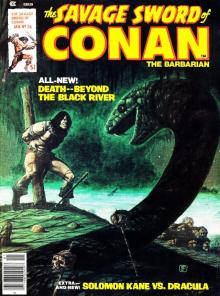 Beyond the Black River
Beyond the Black River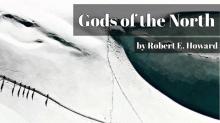 Gods of the North
Gods of the North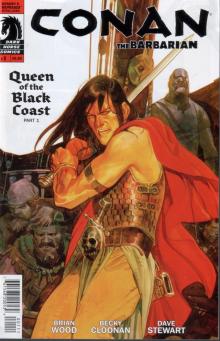 Queen of the Black Coast
Queen of the Black Coast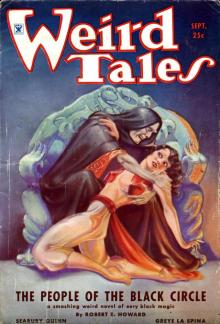 The People of the Black Circle
The People of the Black Circle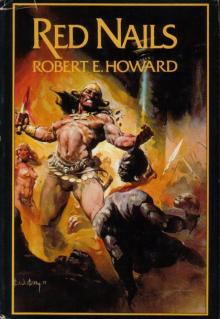 Red Nails
Red Nails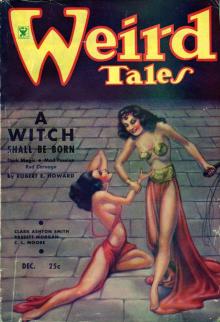 A Witch Shall Be Born
A Witch Shall Be Born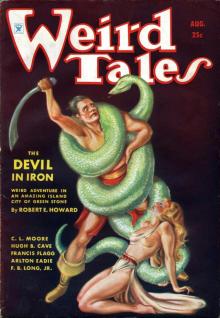 The Devil in Iron
The Devil in Iron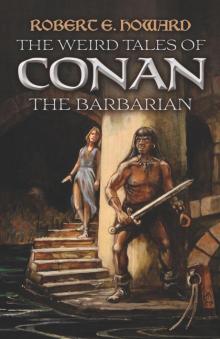 The Weird Tales of Conan the Barbarian
The Weird Tales of Conan the Barbarian The Bloody Crown of Conan
The Bloody Crown of Conan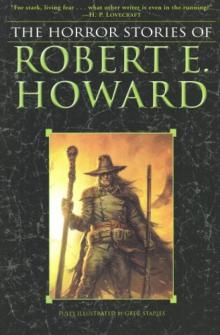 The Horror Stories of Robert E. Howard
The Horror Stories of Robert E. Howard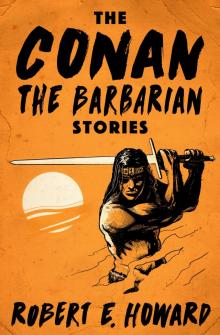 Conan the Conqueror
Conan the Conqueror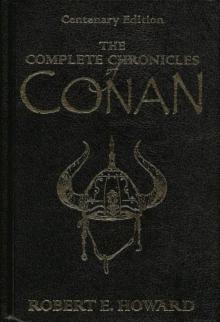 Conan the Barbarian
Conan the Barbarian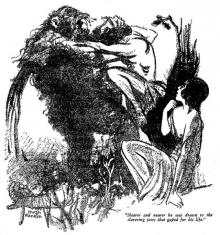 Shadows in the Moonlight
Shadows in the Moonlight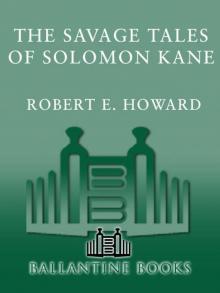 The Savage Tales of Solomon Kane
The Savage Tales of Solomon Kane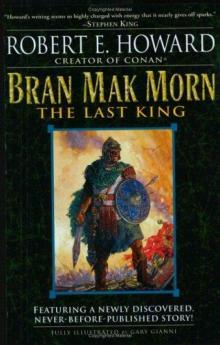 Bran Mak Morn: The Last King
Bran Mak Morn: The Last King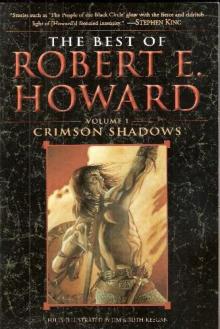 The Best of Robert E. Howard Volume One: Crimson Shadows
The Best of Robert E. Howard Volume One: Crimson Shadows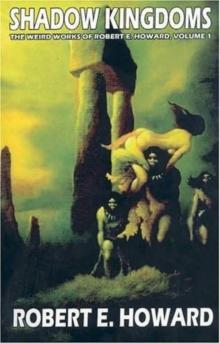 The Best of Robert E. Howard: Crimson Shadows (Volume 1)
The Best of Robert E. Howard: Crimson Shadows (Volume 1)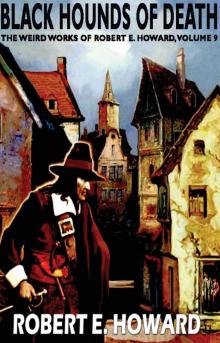 Black Hounds of Death
Black Hounds of Death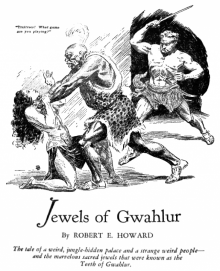 Jewels of Gwahlur
Jewels of Gwahlur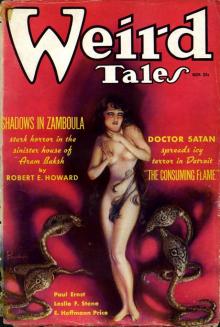 Shadows in Zamboula
Shadows in Zamboula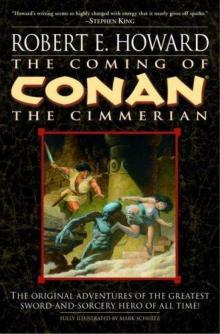 The Coming of Conan the Cimmerian
The Coming of Conan the Cimmerian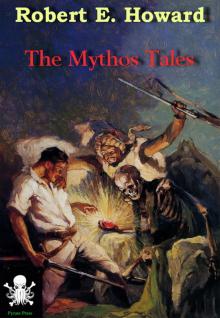 The Mythos Tales
The Mythos Tales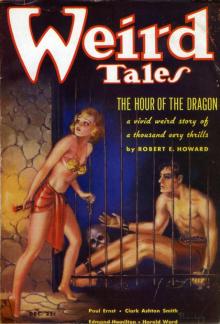 The Hour of the Dragon
The Hour of the Dragon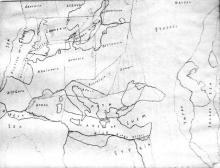 The Hyborian Age
The Hyborian Age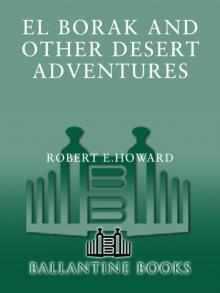 El Borak and Other Desert Adventures
El Borak and Other Desert Adventures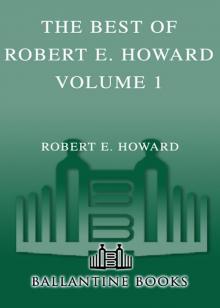 The Best of Robert E. Howard Volume 1 The Best of Robert E. Howard Volume 1
The Best of Robert E. Howard Volume 1 The Best of Robert E. Howard Volume 1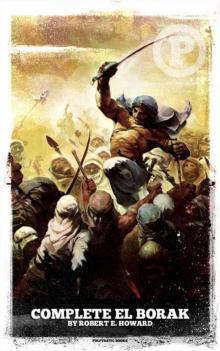 El Borak: The Complete Tales
El Borak: The Complete Tales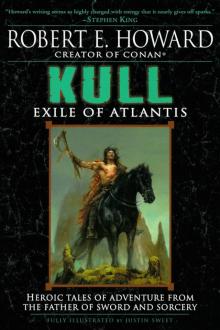 Kull: Exile of Atlantis
Kull: Exile of Atlantis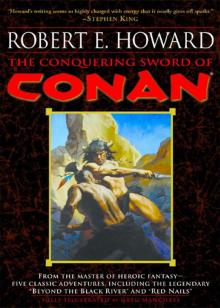 The Conquering Sword of Conan
The Conquering Sword of Conan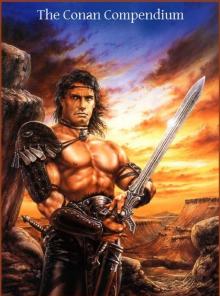 The Conan Compendium
The Conan Compendium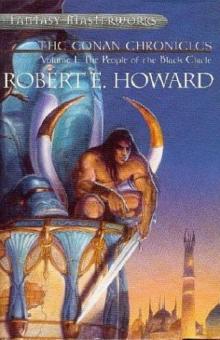 The Conan Chronicles: Volume 1: The People of the Black Circle
The Conan Chronicles: Volume 1: The People of the Black Circle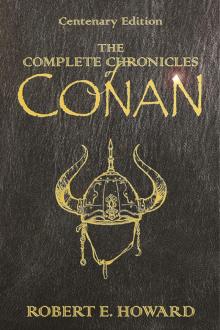 The Complete Chronicles of Conan: Centenary Edition
The Complete Chronicles of Conan: Centenary Edition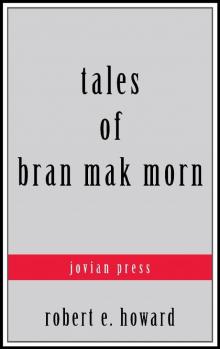 Tales of Bran Mak Morn (Serapis Classics)
Tales of Bran Mak Morn (Serapis Classics)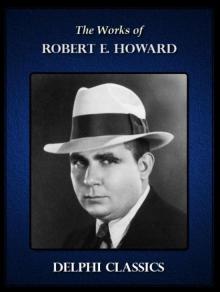 Delphi Works of Robert E. Howard (Illustrated) (Series Four)
Delphi Works of Robert E. Howard (Illustrated) (Series Four)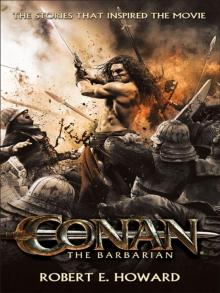 Conan the Barbarian: The Stories That Inspired the Movie
Conan the Barbarian: The Stories That Inspired the Movie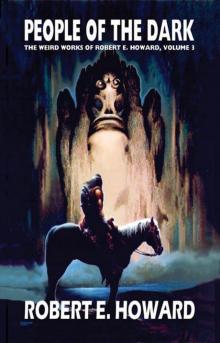 People of the Dark Robert Ervin Howard
People of the Dark Robert Ervin Howard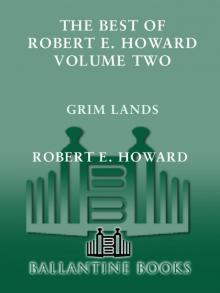 Grim Lands
Grim Lands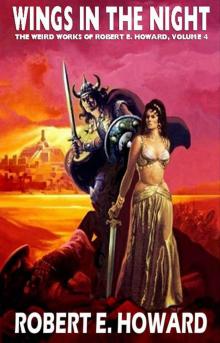 Wings in the Night
Wings in the Night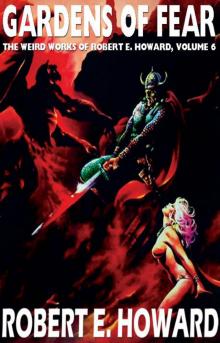 Gardens of Fear
Gardens of Fear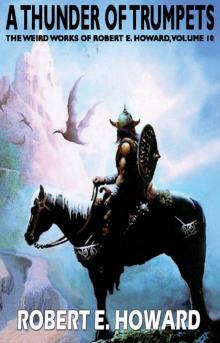 A Thunder of Trumpets
A Thunder of Trumpets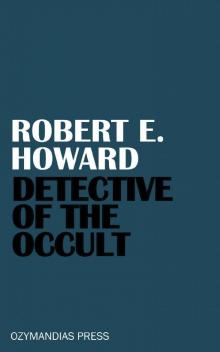 Detective of the Occult
Detective of the Occult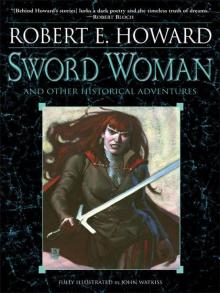 Sword Woman and Other Historical Adventures
Sword Woman and Other Historical Adventures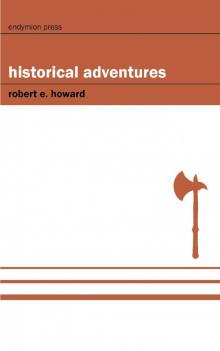 Historical Adventures
Historical Adventures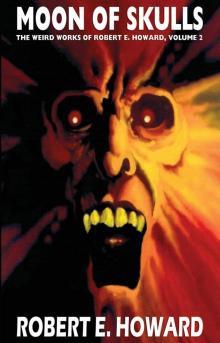 Moon of Skulls
Moon of Skulls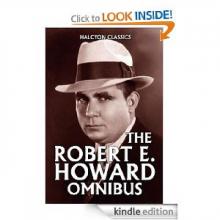 The Robert E. Howard Omnibus: 97 Collected Stories
The Robert E. Howard Omnibus: 97 Collected Stories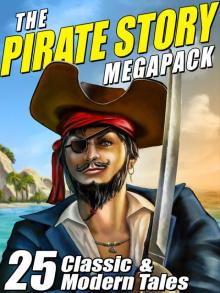 The Pirate Story Megapack: 25 Classic and Modern Tales
The Pirate Story Megapack: 25 Classic and Modern Tales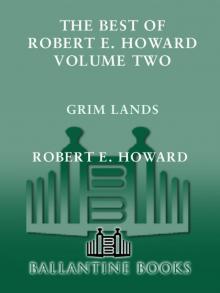 The Best of Robert E. Howard, Volume 2
The Best of Robert E. Howard, Volume 2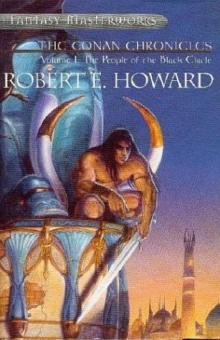 The Conan Chronicles, Vol. 1: The People of the Black Circle
The Conan Chronicles, Vol. 1: The People of the Black Circle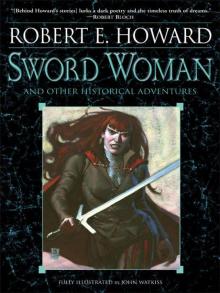 Sword Woman and Other Historical Adventures M
Sword Woman and Other Historical Adventures M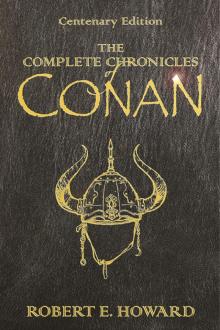 The Complete Chronicles of Conan
The Complete Chronicles of Conan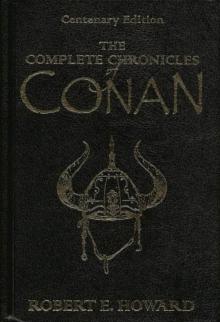 Conan the Barbarian: The Chronicles of Conan (collected short stories)
Conan the Barbarian: The Chronicles of Conan (collected short stories)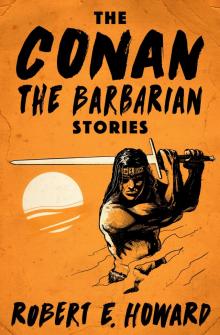 The Conan the Barbarian Stories
The Conan the Barbarian Stories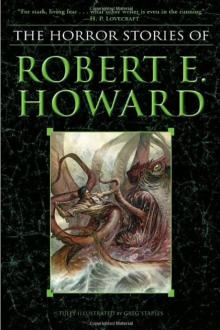 The Best Horror Stories of
The Best Horror Stories of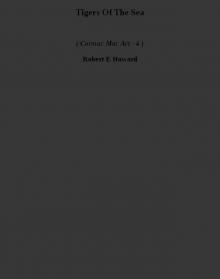 Tigers Of The Sea cma-4
Tigers Of The Sea cma-4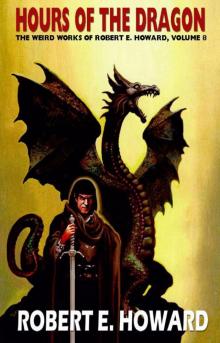 The Hours of the Dragon
The Hours of the Dragon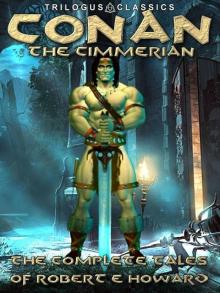 Conan the Cimmerian: The Complete Tales (Trilogus Classics)
Conan the Cimmerian: The Complete Tales (Trilogus Classics)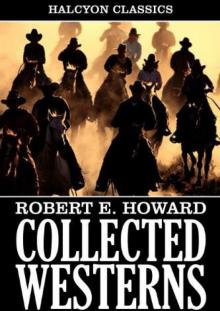 Collected Western Stories of Robert E. Howard (Unexpurgated Edition) (Halcyon Classics)
Collected Western Stories of Robert E. Howard (Unexpurgated Edition) (Halcyon Classics)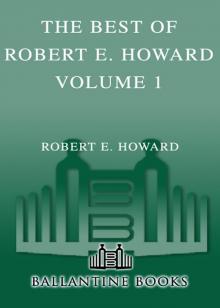 The Best of Robert E. Howard, Volume 1
The Best of Robert E. Howard, Volume 1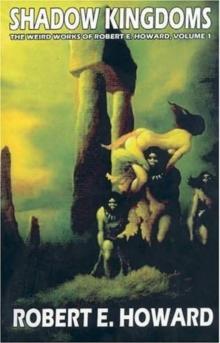 Shadow Kingdoms
Shadow Kingdoms